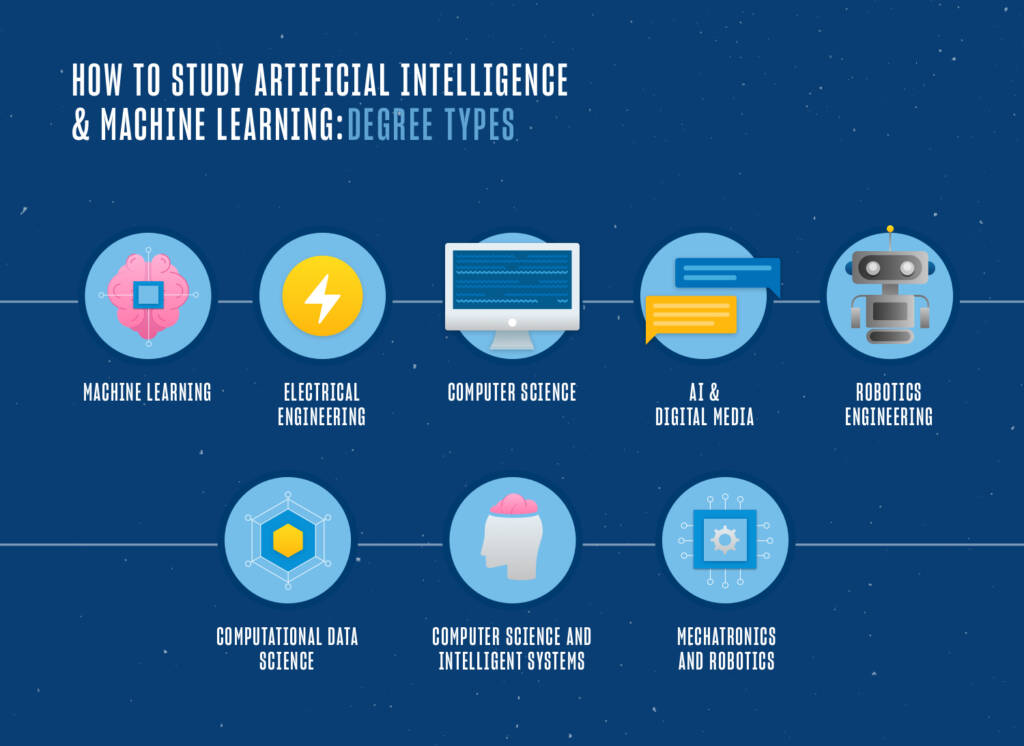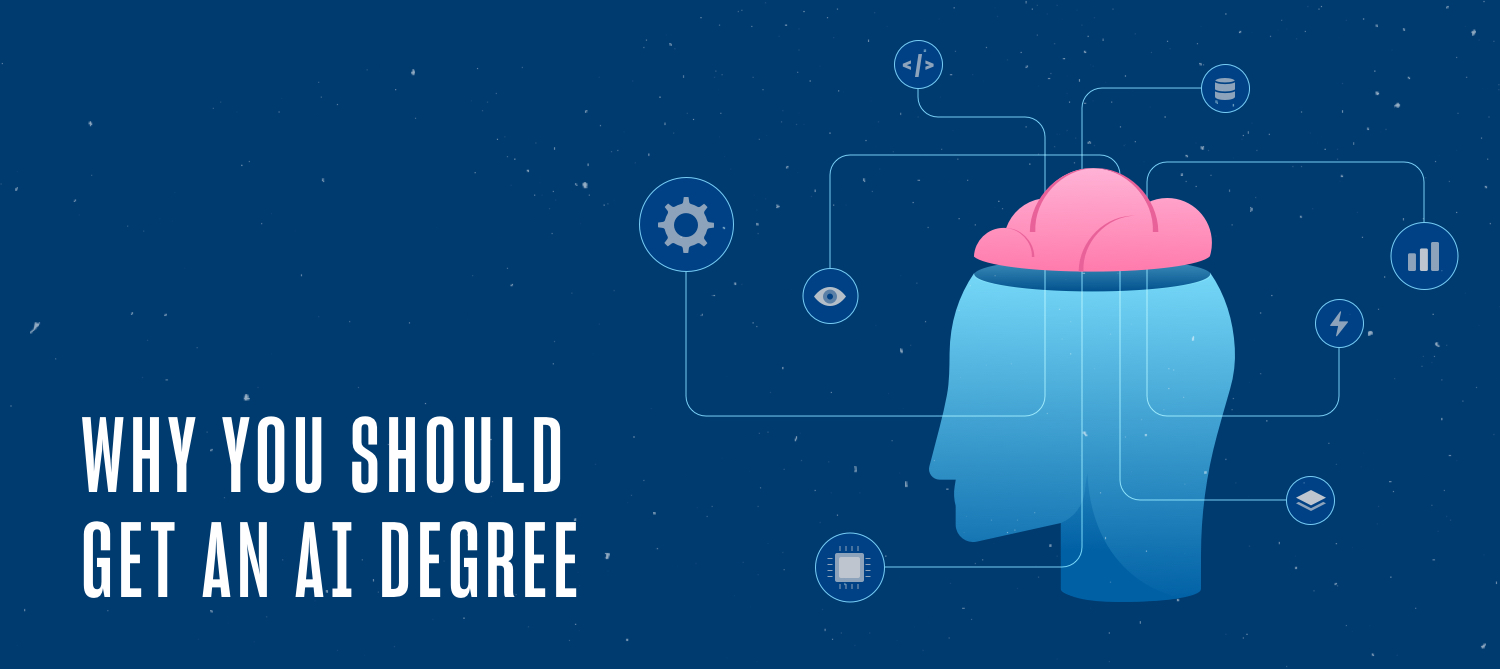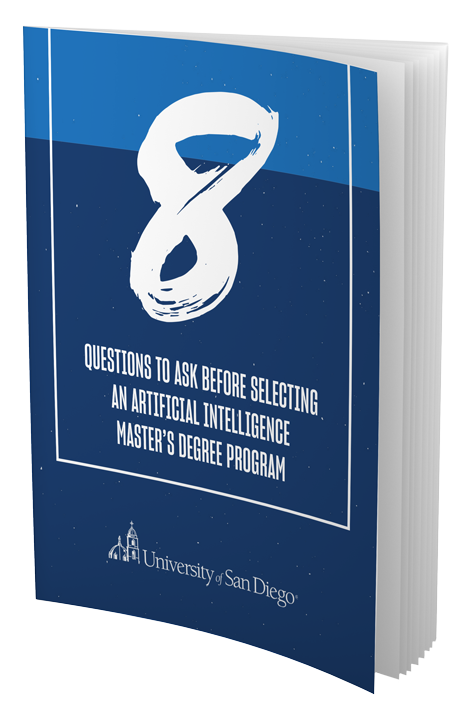Why (and How) to Get a Master’s in AI or ML in 2024
If you’re just starting out in an artificial intelligence position, or you’re looking to take your career to the next level, it might be time to consider an advanced degree, which can position you above the competition and help you secure a lucrative six-figure salary. But which advanced degree is right for you?
In this guide, we’ll explore two of the most popular options — Artificial Intelligence and Machine Learning — and outline the similarities, differences and benefits of each.
Difference Between AI and ML
First, let’s explore the difference between artificial intelligence (AI) and machine learning (ML).
Investopedia defines artificial intelligence as “the simulation of human intelligence in machines that are programmed to think like humans and mimic their actions. The term may also be applied to any machine that exhibits traits associated with a human mind such as learning or problem-solving.”
“A subset of artificial intelligence is machine learning, which refers to the concept that computer programs can automatically learn from and adapt to new data without being assisted by humans.”
Some good examples of machine learning include:
- Facebook, which learns a user’s behavior to suggest friends, content, etc.
- Spotify, which learns a user’s music preferences and recommends similar music or a language translation.
Machine learning is just one of the ways in which we can achieve artificial intelligence. According to Analytic Steps, other sub-disciplines of AI include neural networks, robotics, expert systems, fuzzy logic and natural language processing. IBM Watson is a good example of a neutral network, which Ideamotive defines as “mathematical models that kind of imitate the functioning of the human brain. Neural networks are the systems that can learn. They act not only in accordance with given algorithms and formulas but also on the basis of past experience.” Machine learning is also used in the classification and diagnosis of diseases in health care.
What is an Artificial Intelligence Degree?
As you explore career options in artificial intelligence, you may come across job listings that require an advanced degree.
A master’s degree in AI degree provides real-world applications and experience and is designed to prepare graduates for success in this fast-growing field. There is typically a significant focus on practical applications of AI in business and industry, and the coursework usually focuses on a range of introductory and advanced AI-specific topics.
A good master’s degree program will feature experienced AI practitioners and cover technical aspects that are critical to the AI field. Finally, while earning their degree, students will learn about practical, real-world AI applications in addition to theoretical concepts.
Why You Should Get an AI Degree
This degree is ideally suited for those with a background in science, math, engineering, statistics, or technology. It can also be useful if you’re looking to transition into AI from other various backgrounds.
A degree in artificial intelligence is also a broad one that can apply to a lot of careers, including data analytics, user experience, researcher, research scientist, software engineer, AI engineer and more. Plus, with a booming job market that’s expected to continue growing, a master’s degree can give you an edge over the competition. In fact, the AI market is projected to grow to a $190 billion industry by 2025, according to ZoomInfo, a subscription-based software as a service company.
A master’s degree in AI means skilled professionals are strong contenders for a wide range of six-figure positions across numerous industries. The average salary for an AI programmer is approximately $100,000 to $150,000, and salaries are significantly higher for artificial intelligence engineers, averaging $171,715 with the top 25% earning above $200,000, according to one job search site.
Ready to Advance Your Career in AI? Watch Our Webinar and Learn How to Position Yourself for Success
The good news is that an AI degree spans a wide variety of roles, including domain experts, AI programmers and engineers, data and research scientists, machine learning engineers, business intelligence developers, product designers, user experience engineers, ethical system developers, executive and functional managers, IP attorneys, and more. According to the blog post 7 Reasons Why You Should Invest in Master’s in Artificial Intelligence, “taking the time to take up a master’s degree in artificial intelligence really gives you a sturdy foundation of skills and knowledge that are crucial in helping you adapt to the rapid changes that are going on in it. Assuming AI really is your passion and you plan to build a long-term career around it, settling for something less than an MS is not advisable.”
What Is a Machine Learning Degree?
A machine learning degree is a good idea if you’re looking for a more specialized subsection of artificial intelligence.
Why You Should Get a Machine Learning Degree
Similar to AI, this type of advanced degree can give you an edge over the competition and position you for a lucrative, high-demand position; in fact, many machine learning positions have a salary range of $108,000 to $175,000.
According to the Discover Data Science blog, “An undergraduate degree alone will not be enough for the vast majority of machine learning engineer job openings. Master’s degrees in data science, computer science, software engineering or the like, or even a Ph.D. in machine learning would provide a great many options for machine learning engineers.”
How to Study Artificial Intelligence & Machine Learning: Courses
Artificial intelligence courses will likely include a general introduction/overview and the following: probability and statistics, natural language processing, computer vision, neural networks, internet of things and ethics in artificial intelligence. There is also a good chance students may take a course or two on machine learning.
Core machine learning courses are focused more on deep learning, high-level mathematics, applied machine learning, statistics, research, data analysis, artificial intelligence and more.
How to Study Artificial Intelligence & Machine Learning: Degree Types

An advanced degree is the best way to position yourself ahead of the competition and gain experience as a top contender for an AI or ML position. Plus, there are a variety of programs available, depending on your location, degree preference and flexibility.
For a career in machine learning, you can obtain an advanced degree in Machine Learning, Computational Data Science, Computer Science, Electrical Engineering and Computer Science and Intelligent Systems. There are also many professional machine learning certificates available.
An advanced degree in Applied Artificial Intelligence is an ideal choice if you’re looking for a broader degree that you can apply to a variety of AI-related jobs, including machine learning. Other advanced degrees in Computer Science, AI and Digital Media, Robotics, Robotics Engineering and Mechatronics and Robotics are also applicable for artificial intelligence careers.
If you’re looking for a flexible advanced degree option that will help set you apart from the competition, whether you’re just starting out in AI or considering a career move within the field, consider the University of San Diego. A highly regarded industry thought leader and education provider, USD offers an innovative, online AI master’s degree program, the Master of Science in Applied Artificial Intelligence, which is designed to prepare graduates for success in this important fast-growing field. This program includes a significant emphasis on real-world applications, ethics, privacy, moral responsibility and social good in designing AI-enabled systems.




